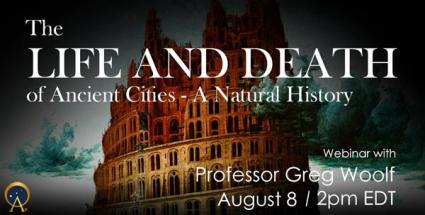
When one imagines the ancient Mediterranean world, it is often a world of spectacular cities, whose monuments and institutions provided the model for the vast urban worlds we inhabit today. Recent research has emphasized some of the differences between our world and theirs. Today, more than half the world's population lives in huge cities with populations in the millions. Then, maybe only one in ten people lived in towns and they were small—really small—with populations of just a few thousand. Even by the standards of ancient Egypt or Mesopotamia the cities of the Greeks, Romans, Etruscan, and Phoenicians were tiny.
Professor Greg Woolf talks about the implications and shows how evolutionary theory explains the rise of cities across the world in the last 6,000 years, and how ecology explains the very small scale of Mediterranean urbanism. He will illustrate how, despite their small size, these urban experiments proved so influential on the societies that came after Greece and Rome.
[[{"type":"media","view_mode":"media_original","fid":"12170","attributes":{"alt":"Professor Greg Woolf","class":"media-image","height":"164","style":"width: 161px; height: 164px; float: left; margin: 10px;","typeof":"foaf:Image","width":"161"}}]] Professor Greg Woolf is an historian and archaeologist specializing in the Roman empire. He has published on various aspects of the ancient economy, on ancient literacy, on Roman religion, on late prehistoric Europe, and on ancient history in the very long term. His books include Becoming Roman. The origins of provincial civilization in Gaul (1998), Et tu Bruté? The murder of Caesar and political assassination (2006), Tales of the Barbarians: Ethnography and Empire in the Roman West (2011) and Rome. An Empire’s Story (2012) and his latest The Life and Death of Ancient Cities. A Natural History (2020).
Greg Woolf has degrees from Oxford and Cambridge and between 1989 and 1998 held fellowships at various colleges in the two universities. In 1998 he became Professor of Ancient History at the University of St Andrews in Scotland.
Since January 2015 he has been Professor of Classics at the University of London and Director of the Institute of Classical Studies in the School of Advanced Study. He is also an Honorary Professor of Archaeology at University College London.
